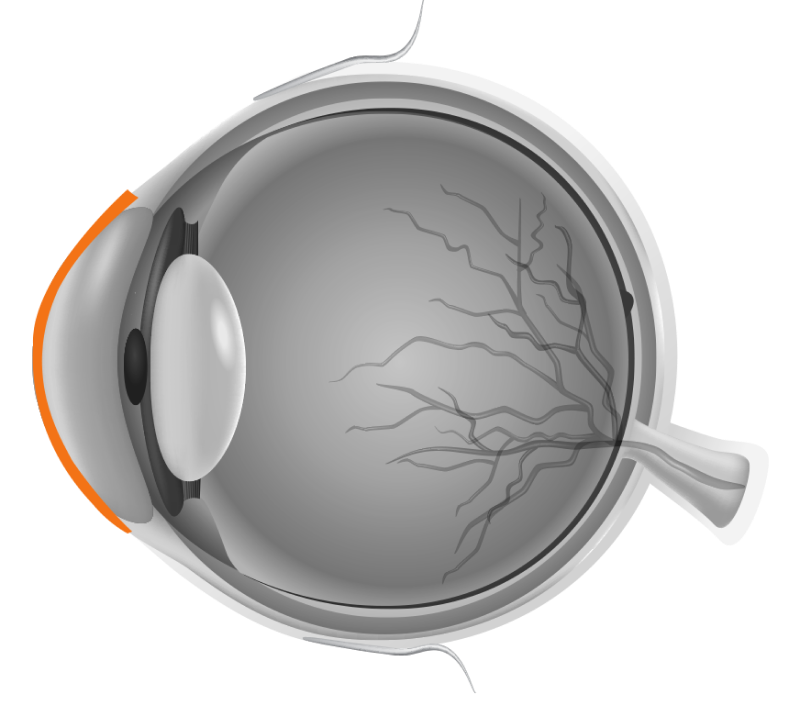TYPES OF CONTACT LENSES
Hard Contact Lenses: They are typically made from plastic and other materials. The most common type of hard contact lens is a rigid gas permeable (RGP) lens, which allows oxygen to flow through the lens to the eye. RGP lenses offer clearer vision than soft lenses on irregularly curved corneas, making them particularly helpful for persons with astigmatism and keratoconus. Additionally, people who suffer from allergies or protein deposits on their contacts may prefer RGP lenses.
Soft Contact Lenses: They are the most popular type of contact lens because they are more comfortable and come in many different varieties. Daily wear contacts are worn during the day and removed at night, and they are often disposable. Alternatively, you may opt for contacts that last longer and only need to be replaced every week, two weeks, or month. Some eye doctors recommend disposable daily wear contact lenses for occasional use.
Extended Wear Contact Lenses: They can be worn overnight but must be removed for cleaning at least once a week. Fewer eye doctors recommend these contact lenses because they increase the risk of serious eye infections.
Toric Contact Lenses: They are designed to correct vision for people with astigmatism, although they are not as effective as hard contact lenses. These can be used for daily or extended wear, but they are generally more expensive than other types of soft contact lenses.
Coloured (tinted) Contact Lenses: They are another option for vision correction, and they can change the colour of your eye. You can get them as daily wear, extended wear, or toric lenses.
Decorative (cosmetic) Contact Lenses: They are designed to change the appearance of your eye, but they do not correct vision. They include coloured contacts and lenses that can make your eyes look like vampires, animals, or other characters. They can also be used to conceal certain eye problems caused by injuries or present from birth. Although they do not correct vision, a prescription is required for decorative contact lenses, and they must be treated like prescription to avoid serious eye infections. This means cleaning them regularly and thoroughly as directed.
It is important to consult an eye doctor to determine the best type of contact lens for you.
DO’S AND DON’TS OF CONTACT LENS WEAR
Proper use and care of your contact lenses is crucial for maintaining healthy eyes and clear vision. The following are a few things to remember:
Do’s
- Before handling your contact lenses, carefully wash and dry your hands.
- Clean your lenses daily with a contact lens solution and follow the manufacturer’s instructions.
- Replace your lenses as recommended by your eye doctor, typically every two weeks to one month.
- Remove your lenses before swimming or showering to avoid the risk of infection.
- Store your lenses properly in a clean, dry case and replace the case every three months.
Don'ts
- Wear your lenses for longer than recommended, as this can cause discomfort and increase the risk of infection.
- Share your lenses with others, as this can spread bacteria and increase the risk of infection.
- Use tap water to clean or store your lenses, as it can contain harmful microorganisms that can lead to infection.
- Sleep with your lenses on unless specifically prescribed by your doctor, as this can increase the risk of infection and other complications.
- Use expired or damaged lenses, as they can cause irritation and increase the risk of infection.
Remember to always follow your eye doctor’s instructions and recommendations for the best contact lens experience. If you experience any discomfort, redness, or vision changes while wearing contact lenses, be sure to contact your eye doctor right away.
POSSIBLE COMPLICATIONS
While contact lenses are generally safe and effective, there are some potential complications that wearers should be aware of. These may include:
Infections: Contact lenses can increase the risk of bacterial, viral, or fungal infections of the eye, which can be serious and require prompt treatment.
Corneal ulcers or abrasions: Wearing contact lenses for too long or not following proper cleaning and storage protocols can cause damage to the cornea, leading to painful ulcers or abrasions.
Allergic reactions: Some people may develop an allergic reaction to the materials used in contact lenses, which can cause redness, itching, and discomfort.
Dry eyes: Contact lenses can exacerbate symptoms of dry eyes, causing discomfort and irritation. Giant papillary conjunctivitis: This is a type of eye inflammation that can occur with contact lens use, leading to redness, itching, and discomfort.
Corneal neovascularization: Wearing contact lenses for extended periods can cause the growth of new blood vessels in the cornea, which can affect vision and may require treatment.
It is important to follow proper hygiene and maintenance protocols when using contact lenses, as well as to schedule regular eye exams to ensure the health of your eyes. If you experience any discomfort, redness, or vision changes while wearing contact lenses, it is important to contact your eye doctor right away.
Contact Us
A Unit of Shantilal Shanghvi Foundation
Copyright © JGDHealth. All Rights Reserved.


